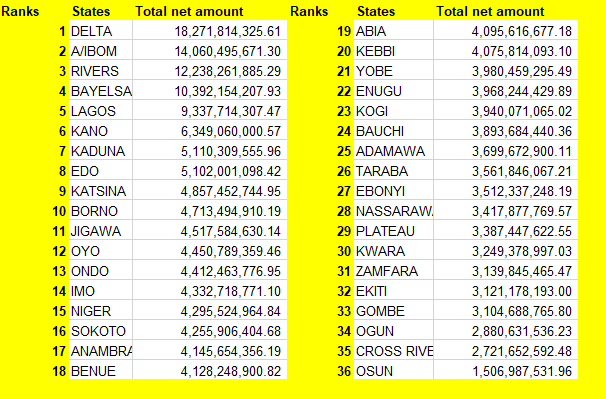States and Local Governments in Nigeria shared a total of N294.83 billion in May 2019. This was revealed in the latest report on the disbursements made by the Federation Account Allocation Committee (FAAC).
According to the FAAC report which was released by the National Bureau of Statistics (NBS), a total sum of N616.20 billion was disbursed in May to the three tiers of government (i.e, Federal, States, and Local Governments).
Allocation Breakdown by Tiers: Out of the total N616.20 billion disbursed to the three tiers of government in May, the Federal Government received a total of N253.92 billion.
- Breakdown of FGN share revealed that the sum of N199.58 billion was disbursed to the consolidated revenue account.
- Also, N4.56 billion as a share of derivation and ecology; N2.28 billion as stabilization fund; N7.65 billion for the development of natural resources; and N5.44 billion to the Federal Capital Territory (FCT) Abuja.
- States received a total of N168.06 billion while Local Governments received N126.28 billion
- The sum of N46.35 billion was shared among the oil-producing states as 13% derivation fund.
- Nigeria Customs Service (as one of the revenue-generating agencies) received N5.38 billion
- Federal Inland Revenue Service received N6.78 billion
- Department of Petroleum Resources (DPR) received N3.12 billion

[ALSO READ: FAAC disburses N617 billion as South-South scoops the highest]
Billions received by states: In May 2019, Delta State received the biggest allocation. The total amount the state received was N18.2 billion, followed closely by Akwa Ibom (N14.06 billion), and Rivers State (N12.2 billion). Other states with the biggest allocations received include;
- Bayelsa – 10.3 billion
- Lagos – N9.3 billion
- Kano – 6.3 billion
- Kaduna – N5.1 billion
- Edo – N5.1 billion
- Katsina – 4.8 billion
- Borno – N4.7 billion

States’ Over-reliance on FAAC: The monthly federal statutory allocation has been the driver of economic activities in most states in Nigeria. As seen in recent years, salaries of workers and other government recurrent expenditures are funded using the allocation that comes from the Federal Government.
What this implies, therefore, is that any slight depletion in the federation account will directly affect economic activities in most states; albeit in different magnitudes. With the decline in allocation for the month under review, this may further dampen economic activities.
Meanwhile, there are concerns as the rise in debts accruable to some states is seriously eating up the allocation to the said states. According to the NBS report, state governments paid the sum of N3.14 billion debt in just one month. Also, the recent debt report by the debt management office (DMO) shows that all the 36 states accrued domestic debt of N3.97 trillion or US$12.9 billion as of the end of March 2019.
The critical downside is that while debt is building up, only a few states in Nigeria have sufficient Internal Generated Revenue enough to spur economic activities without the government’s monthly allocation.
[READ FURTHER: Nigeria’s total debt stock rises to N24.9 trillion]














Nice
Pls how much does each local government received? President Buhari said that the local government received ₦300million each, pls how that’s true
Local government allocation for Enugu state in 2022